Is education in the Metaverse a dream or fantasy? Does it have to exist in a Dystopian society as seen in science fiction novel turned sci-fi movie, Ready, Player, One? Are we destined post-pandemic to exist as replicas of ourselves like seen in the Surrogates? Living through what seems the never-ending COVID-19 global pandemic would make it seem so. As college students shifted from in person instruction from a subject matter expert to a Zoom classroom, it may appear as if life as they knew it with real human interactions was now history. However, when there is an interruption that occurs to life as we have known it, there has also been ingenuity. Creating a space where the classroom was more engaging than watching a PowerPoint or video stream across the screen for the next 50 minutes was a likely next step for innovative professors at Morehouse College. Morehouse College is a historically, Black college and University (HBCU) in Atlanta, Georgia where liberal arts education has been its claim to fame. Well, that and a famous alumnus, Dr. Martin Luther King, Jr. However, this Black, all-male college had students in the Spring of 2021 take courses in the Oculus Quest 2 headset in Men’s Health, World History, and Advanced Inorganic Chemistry. They also had modules in biology and chemistry with interwoven cross-disciplinarity in literature.

Morehouse’s VR Pioneer Professors. Starting with top left going clockwise, Dr. Tanya Clark (English), Dr. Muhsinah Morris (Chemistry), Dr. Ethell Vereen (Biology) and Dr. Ovell Hamilton (History) meet regularly to plan lessons for students in VR.
Morehouse has now entered the Metaverse and is creating the framework to do it in as many disciplines as possible. Dr. Ovell Hamilton, author of Sanctified Revolution: The Church of God in Christ: A History of African-American Holiness states how he was able to use naval commands with his battleship scene that he used in the Navy except students were imported back to WWII. Dr. Ethell Vereen mastered field trips for students through the entire male human body while addressing issues of disease and health disparities in the black community, primarily amongst males. Dr. Tanya Clark is a master at making parallels about the envisioning of black excellence as superhuman to continue with the often-misplaced mysticism of black excellence or magic in her Blacks in Wonderland course. Dr. Muhsinah Morris, worked on increasing visual spatial intelligence in chemistry majors while helping them grasp how this content was connected to the real world through problem-based learning modules. Each professor has their own passion for meeting student learning outcomes in an innovative way.
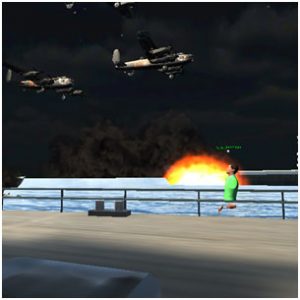
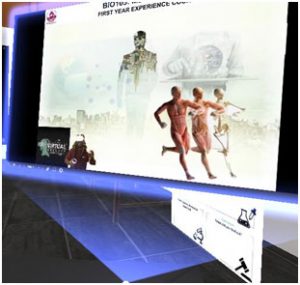
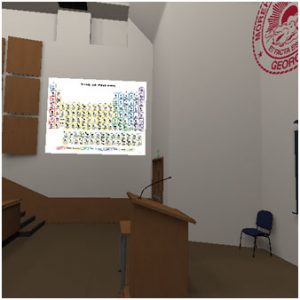
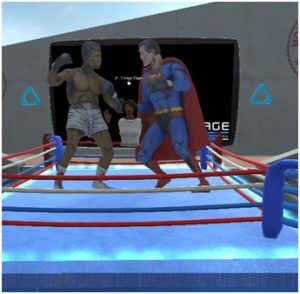
Snapshots of VR Classrooms at Morehouse College. From the top left going clockwise, Dr. Vereen’s Biology Men’s Health First-Year Experience Course is welcomed on Day 1 with culturally relevant images of the professor in his Egyptian headdress and VR head mounted display on. Second, Dr. Hamilton’s students were transported back to WWII as bombers flew overhead while they were on a naval battleship. Dr. Morris’ chemistry lecture hall has Morehouse logos and a periodic table like the familiar chemistry lecture hall on campus in Merrill Hall. Dr. Clark’s students were able to explore Superman vs. Muhammad Ali and witness their boxing match in 3D rather than as a depiction in the comic books.
With visionary leaders at the helm, Morehouse College is set on liberating the minds of young black men in a way that drives innovation and sparks curiosity in students which had been plateauing as education reforms fell flat. Students are now able to access their courses in their core curricular disciplines on a platform typically used for gamification. However, instead of listening to a lecture or viewing another PowerPoint, students can engage with one another but also with the content in real-time 3D. Morehouse students now meet for classes in a singular space just like when they were in person, just from their own dorm rooms or living spaces. With the Delta variant of COVID-19 driving numbers up rather than down, warring with vaccination data, hybrid learning has become part of the lingo when speaking of academic planning. The fluidity in which VR can be used both in person for classes that meet or remotely for those that can’t has seamlessly been done in higher education by Morehouse and they are perfecting it daily.
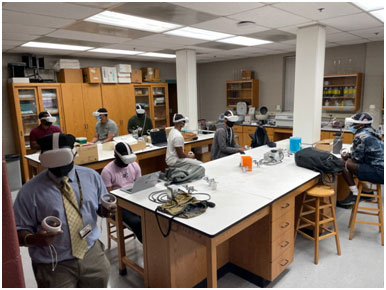
VR In Person. In the Fall of 2021, students are being led through the Microbiology Metaverse by Dr. Ethell Vereen, Assistant Professor in Biology and PI of the Vereen Research Institute (VRI).
Partnering with start-up tech company and 2021 PIEoneer Winner for Digital Innovation of the Year-Learning, Victory XR meant that there would be the creation of a digital twin campus of Morehouse where students would spawn built on the Engage platform. Emerging on the historic campus where educating disciplined minds for Black men has always brought out the very best in the brightest young minds, being in VR preserved the level of excellence known at this HBCU for over 150 years. For this private institution, the innovative education pedagogical tool of VR was well worth it. Students felt connected, their desires respected, and their immersive distraction-free learning spaces made them yearn for more content regardless of its level of difficulty. It was a winning semester in Spring 2021 at Morehouse and proves to be a brighter one as they continue to expand this effort. Morehouse College is in the Metaverse, and they are changing the trajectory of higher education towards a brighter future.












